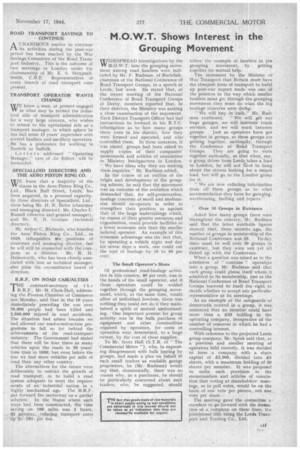M.O.W.T. Shows Interest in the Grouping Movement
Page 19

If you've noticed an error in this article please click here to report it so we can fix it.
WIDESPREAD investigations by the VV M.O,W.T. into the grouping movement among road , hauliers were indicated by Mr. F. Rudman, of' Rochdale, chairman of the National Conference of Road Transport Groups, in a speech at Leeds, last week. He stated that, at the recent meeting of the National Conference of Road Transport Groups at Derby, members reported that, in their districts, the Ministry was making a close examination of the movement. Each District Transport Officer had had instructions to forward to his R.T.C. infornkation as to how many groups there were in his district, how they were formed and operated, and who controlled them. In three instances, it was stated, groups had been asked to supply copies of their companies' memoranda and articles of association to Ministry headquarters in London. " We have ideas why they are making these inquiries," Mr. Rudman added.
In the course of an outline of the 'origin and development of the grouping scheme, he said that the movement was an outcome of the evolution which demanded • that, for self-preservation, haulage concerns of small and mediumsize should co-operate in order to strengthen their position as against that of the large undertakings which, by reason of their greater resources and organization, could provide facilities at a lower economic rate than the smaller isolated operator. An example of this economic advantage was. the fact that, by operating a vehicle night and day for 'seven days a week; one could cut the cost of haulage by 10 to 50 per cent.
. The Small Operator's Share
Of professional ,road-haulage activities in this country, 80 per cent, was in the hands of the small operator, and if those _ operators could be welded together through the grouping movement, which, at the same time, would allow of individual, freedom, !there was nothing they could not do if they maintained a spirit of mutual understanding. One important avenue for group activity was in the bulk purchase of equipment and other commodities required by operators, for costs of operation were determined, to a large extent, by the Cost of these supplies.
To Mr. Scott Hall (S.T.R. of "The Commercial Motor ")., who, in expressing disagreement with bulk buying by groups, bad made a plea on behalf of such small traders as roadside garage proprietors, he (Mr. Rudman) would say that, economically, there was no reason why, as a purchaser, he should be particularly concerned about such traders, who, he suggested, should follow the example of hauliers in the grouping movement, by getting together for mutual help.
The statement by the Minister of War Transport that Britain must have the cheapest form of transport to build up post-war export trade was one of the pointers to the way which smaller hauliers most go: through the grouping movement they must do what the big haulage concerns were doing.
" We will buy in bulk," Mr. Rudman continued. " We will get our huge garages, we will institute truak services, and we will work between groups. Just as operators have got together in groups, so these groups are getting together, nationally, through the Conference of Road Transport Groups. They are going to work together nationally, so that when, say. a group driver from Leeds takes a load to London, he will not gave to hang about the streets looking for a return load, but will ga to the London group for it.
" We are now collating information from all these groups as to what accommodation they have for garaging, warehousing, fuelling and repairs."
Over 30 Groups in Existence
Asked how many groups there were throughout the country, Mr. Rudman said that the latest available figures showed that, three months .ago, the number of groups in membership of the National Conference was 23. To-day there must be well over 30 groups in existence, but they were not yet all linked up with the Conference.
When a question was raised as to the admission of " combine " operatqrs into a group, Mr. Rudman said that each group could please itself whom it admitted to its membership, just as the National Conference of Road Transport Groups reserved to itself the right to decide whether to accept any particular representative at its meetings.
As an example of the safeguards of democratic control in a group, it was instanced that no Member could have more than a £25 holding in the operating company, irrespective of the number of concerns in which he had a controlling interest.
With reference to the projected Leeds group company, Mr. Spink said that, at a previous and smaller meeting of operators held recently, it was decided to form a company with a share capital of £2,000, divided into 25 shares, with a maximum holding of 20 shares per member. It was proposed to make such provision in the memorandum and articles of association that voting at shareholders' meetings, or in poll votes, would be on the basis of one vote per person, not one. vote per share..
The meeting gave the committee a mandate to go forward with the formation of a company on these lines, the proVieional title being the Leeds Traitsport and Trading Co., Ltd.




















































